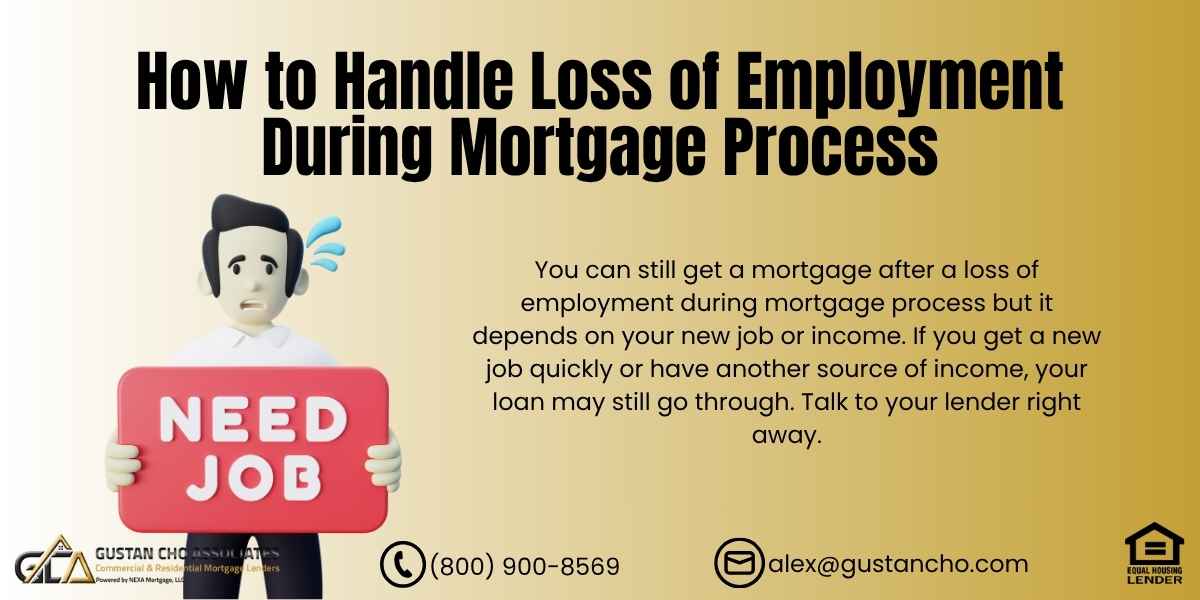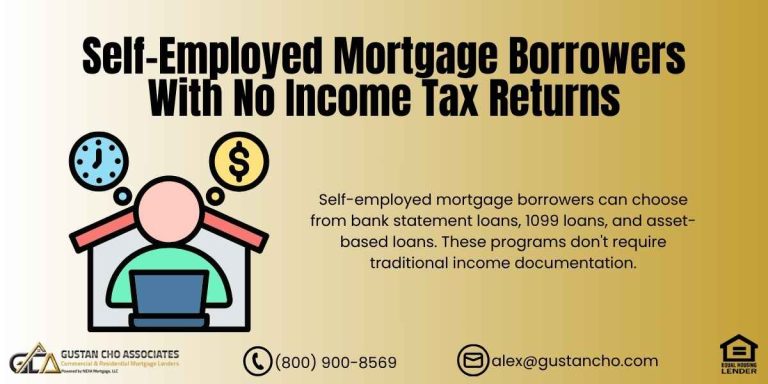Loss of Employment During Mortgage Process: What You Need to Know
Losing your job while trying to buy a home can feel like your world is crashing down. If you ask, “Can I still get a mortgage after losing my job?” — you’re not alone. Every year, thousands of borrowers across the country face this exact issue.
At Gustan Cho Associates, we understand how stressful it is when life throws a curveball right before closing on a house. The good news? A job loss doesn’t always mean your mortgage is dead. In this article, we’ll explain what happens when there’s a loss of employment during mortgage process, what steps you should take, and how to still get approved.
Can You Still Buy a House If You Lose Your Job?
The short answer? Yes, but there are conditions.
Mortgage lenders need to know you have the income to make your monthly payments. When there’s a loss of employment during mortgage process, lenders get concerned about whether you can afford the loan. They’re required to verify your income and employment not just once, but multiple times before closing.
If you lose your job before your loan closes, your mortgage approval may be paused or denied until you can show proof of new income.
Lost Your Job During the Mortgage Process? Here’s What to Do Next
Learn how to handle a job loss and still keep your mortgage application on track.
What Lenders Do When There’s a Loss of Employment
Most borrowers are surprised to learn this: your lender will verify your job more than once. Even if they have already called your employer during the early stages, they’ll do a final check just days before closing.
Here’s what lenders look for:
- Are you still employed?
- Is your income stable?
- Is your job likely to continue for the next 3 years?
Suppose there’s a loss of employment during mortgage process. In that case, your lender may suspend your file until you find new work or provide new income documentation.
What If You Get a New Job?
Getting a new job doesn’t mean you’re out of luck. In fact, if the job is full-time and in the same field, it could help.
However, your lender will need to:
- See a formal job offer letter.
- Confirm your start date.
- Get written verification from your new employer.
- Wait until you’ve received at least one or two pay stubs.
Some loan programs — like FHA, VA, and conventional loans — may allow you to close with just a job offer letter if the job starts within 60 days of closing. However, many lenders still want you to provide 30 days of pay stubs to prove the income is real and ongoing.
At Gustan Cho Associates, we work with flexible investors who often allow fast closings even with recent job changes — as long as all documentation checks out.
Should You Change Jobs During the Mortgage Process?
If you’re considering a job switch, it’s important to consult with your lender beforehand. Many borrowers mistakenly believe securing a new position with higher pay guarantees a positive outcome.
However, changing jobs can actually lead to significant delays in the loan process.
This is because the mortgage underwriter must take several additional steps, including recalculating your income, ordering a new employment verification, and reviewing the specifics of your new job offer, such as the pay structure—hourly or salary—and any commissions or bonuses involved.
In some cases, lenders will pause the loan until you’ve received your first paycheck.
To avoid issues, keep your current job until you get the “clear to close.” Then, you can make career moves.
Lost Employment During the Mortgage Process? Stay Calm
We’ll help you understand the impact on your approval and find solutions to move forward.
Loss of Employment During Mortgage Process: What NOT to Do
Here are a few common mistakes to avoid if you lose your job while applying for a mortgage:
Don’t hide it from your lender.
They’ll find out during the final verification anyway. It’s better to be upfront.
Don’t quit until your loan closes.
Even if offered a better job, wait until after closing day.
Don’t assume unemployment benefits will count.
Most lenders don’t count unemployment income unless it is seasonal and recurring (like a teacher or construction worker off-season).
Don’t make other big financial changes.
Avoid applying for new credit cards, co-signing loans, or moving money between accounts.
The key thing to focus on during a job loss while in the mortgage process is maintaining regular communication with your loan officer.
Gaps in Employment: Can You Still Qualify?
Yes! Having a short gap in work history doesn’t automatically kill your loan.
- If you were unemployed for less than 6 months and are now back to work full-time, most lenders only require:
- A job in the same line of work.
- 30 days of pay stubs before closing.
- If you were out of work for 6 months or more, you’ll need to:
- Be employed full-time in a new job for at least 6 months before qualifying.
- Provide pay stubs, W-2s, and possibly a letter of explanation.
We’ve helped many borrowers with employment gaps buy homes successfully. We know how to document and explain the situation properly.
Real-Life Example: What Happens When You Lose Your Job Mid-Process?
Jessica was just 10 days away from closing on her first home when she received the unexpected news that she had been laid off. Distraught, she called her loan officer, fearing that her home purchase was dead in the water.
However, she quickly took action after submitting her termination letter and unemployment notice. Within two weeks, she secured a new job offer.
The lender decided to pause her loan until she received her first paycheck, allowing her to stabilize her financial situation. Just two weeks later, Jessica provided 30 days’ worth of pay stubs, and her loan ultimately closed 21 days afterward, all while maintaining the same interest rate and terms. The moral of her story? Don’t panic—there are always options available.
What to Do Immediately After a Job Loss
If you lose your job while under contract on a home, here’s what to do:
- Call your lender immediately: They can’t help if they don’t know what’s going on.
- Don’t withdraw your application yet: Sometimes your loan can still be saved.
- Start job hunting quickly: Getting a new job fast improves your odds of keeping your home deal alive.
- Ask about using a co-signer: In some cases, a family member can co-sign and help you qualify.
- Explore non-traditional loan programs: Some portfolio and non-QM loans don’t require two-year job history or W-2s if you have enough assets.
At Gustan Cho Associates, we work with more flexible lenders than big banks. If there’s a way to close, we’ll find it.
How Gustan Cho Associates Can Help
We understand that life happens — and sometimes, it happens at the worst time. That’s why we specialize in loans that other lenders can’t close.
When there’s a loss of employment during mortgage process, we can:
- Review your entire financial profile.
- Help you explore new income sources (like self-employment, retirement income, or a spouse’s income).
- Recommend co-signers or loan programs that fit your situation.
- Offer fast closings after new job verification.
We’re available seven days a week, with no lender overlays, no judgment, and no hidden fees.
Employment Loss Doesn’t Have to Derail Your Mortgage
Learn how to handle a job loss during the mortgage process and still secure your home loan.
Final Thoughts: You’re Not Alone
The fear of losing your dream home is real when there’s a loss of employment during mortgage process — but the loan isn’t automatically dead. You still have options with the right strategy and a lender who understands how to work through these situations.
At Gustan Cho Associates, we fight for our borrowers, even when others say no. Borrowers who need a five-star national mortgage company licensed in 50 states with no overlays and who are experts on loss of employment during mortgage process, please contact us at 800-900-8569, text us for a faster response, or email us at alex@gustancho.com.
Frequently Asked Questions About Loss of Employment During Mortgage Process:
Q: Can I Still Get a Mortgage After a Loss of Employment During Mortgage Process?
A: Yes, you can — but it depends on your new job or income. If you get a new job quickly or have another source of income, your loan may still go through. Talk to your lender right away.
Q: Will the Bank Find Out if I Lose My Job During the Loan Process?
A: Yes. Lenders check your job more than once. Even if they called your employer early on, they’ll do a final check right before closing. That’s why a loss of employment during mortgage process must be reported as soon as it happens.
Q: What Happens if I Get a New Job Right After Losing the Old One?
A: You may still qualify. Lenders will need a job offer letter and at least one or two pay stubs. In some cases, they’ll pause the loan until you get those. A fast new job can save your loan after a loss of employment during mortgage process.
Q: Should I Wait to Change Jobs Until After I Close on the House?
A: Yes. Even if it’s a better job, switching too soon can delay or pause your loan. Avoid changes that might cause a loss of employment during mortgage process unless your lender says it’s okay.
Q: Will Unemployment Income Help Me Qualify for a Mortgage?
A: Usually not. Most lenders don’t count unemployment as income unless it’s seasonal and expected. After a loss of employment during mortgage process, you’ll need a steady income from a new job or other source.
6. Can I Use a Co-Signer if I Lose My Job During the Mortgage Process?
A: Yes, in some cases. If you have a trusted co-signer with good income and credit, they may help you qualify after a loss of employment during mortgage process. Ask your lender if this is an option.
Q: How Long do I Need to be on a New Job After Losing the Last One?
A: If you were out of work for less than 6 months, lenders may only need 30 days of pay stubs. But after 6 months or more of unemployment, you’ll need to work at least 6 months in a new job to move forward after a loss of employment during mortgage process.
Q: Can I Still Close on My House if I Lost My Job a Few Days Before Closing?
A: It depends. Lenders check your job just before closing. If there’s a loss of employment during mortgage process at the last minute, your loan may be paused or denied unless you get a new job quickly.
Q: What Should I do Immediately After Losing My Job During the Mortgage Process?
A: Call your lender immediately. Don’t hide it or assume your loan is dead. Quick action can make a big difference after a loss of employment during mortgage process.
Q: How Can Gustan Cho Associates Help if I Lose My Job While Buying a Home?
A: We work with lenders that offer flexible programs. If you lose employment during the mortgage process, we’ll help you explore options like co-signers, asset-based loans, or fast approvals after getting a new job.
This blog about “How to Handle Loss of Employment During Mortgage Process” was updated on July 21st, 2025.
Job Loss While Buying a Home? Here’s How to Protect Your Mortgage
Understand what to do if you lose your job and how to keep your mortgage application intact.









